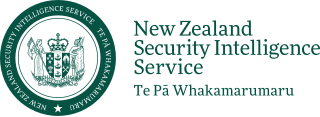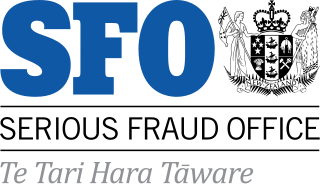Archives New Zealand is New Zealand's national archive and the official guardian of its public archives. As the government's recordkeeping authority, it administers the Public Records Act 2005 and promotes good information management throughout government.
The Department of Internal Affairs (DIA) is the public service department of New Zealand charged with issuing passports; administering applications for citizenship and lottery grants; enforcing censorship and gambling laws; registering births, deaths, marriages and civil unions; supplying support services to ministers; and advising the government on a range of relevant policies and issues.

The New Zealand Police is the national police service and principal law enforcement agency of New Zealand, responsible for preventing crime, enhancing public safety, bringing offenders to justice, and maintaining public order. With over 15,000 personnel, it is the largest law enforcement agency in New Zealand and, with few exceptions, has primary jurisdiction over the majority of New Zealand criminal law. The New Zealand Police also has responsibility for traffic and commercial vehicle enforcement as well as other key responsibilities including protection of dignitaries, firearms licensing, and matters of national security.

The New Zealand Security Intelligence Service (NZSIS) is New Zealand's primary national intelligence agency. It is responsible for providing information and advising on matters including national security and foreign intelligence. It is headquartered in Wellington and overseen by a Director-General, the Minister of New Zealand Security Intelligence Service, and the parliamentary intelligence and security committee; independent oversight is provided by the Inspector-General of Intelligence and Security.

The Government Communications Security Bureau (GCSB) is the public-service department of New Zealand charged with promoting New Zealand's national security by collecting and analysing information of an intelligence nature. The GCSB is considered to be New Zealand's most powerful intelligence agency, and has been alleged to have conducted more espionage and data collection than the country's primary intelligence agency, the less funded NZSIS. This has at times proven controversial, although the GCSB does not have the baggage of criticism attached to it for a perceived failure to be effective like the NZSIS does. The GCSB is considered an equivalent of GCHQ in the United Kingdom or the NSA in the United States.
The Personal Information Protection and Electronic Documents Act is a Canadian law relating to data privacy. It governs how private sector organizations collect, use and disclose personal information in the course of commercial business. In addition, the Act contains various provisions to facilitate the use of electronic documents. PIPEDA became law on 13 April 2000 to promote consumer trust in electronic commerce. The act was also intended to reassure the European Union that the Canadian privacy law was adequate to protect the personal information of European citizens. In accordance with section 29 of PIPEDA, Part I of the Act must be reviewed by Parliament every five years. The first Parliamentary review occurred in 2007.
A gag order is an order, typically a legal order by a court or government, restricting information or comment from being made public or passed onto any unauthorized third party. The phrase may sometimes be used of a private order by an employer or other institution.
Information privacy, data privacy or data protection laws provide a legal framework on how to obtain, use and store data of natural persons. The various laws around the world describe the rights of natural persons to control who is using their data. This includes usually the right to get details on which data is stored, for what purpose and to request the deletion in case the purpose is not given anymore.

The Serious Fraud Office is the public service department of New Zealand charged with detecting, investigating and prosecuting financial crimes, including corruption, of a serious and complex nature.
Privacy law is a set of regulations that govern the collection, storage, and utilization of personal information from healthcare, governments, companies, public or private entities, or individuals.

The Official Information Act 1982 (OIA) is an act of the New Zealand Parliament which creates a public right to access information held by government bodies. It is New Zealand's primary freedom of information law and has become an important part of New Zealand's constitutional framework.

The New Zealand Employment Relations Act 2000 is a statute of the Parliament of New Zealand. It was substantially amended by the Employment Relations Amendment Act 2001 and by the ERAA 2004.

The use of cannabis in New Zealand is regulated by the Misuse of Drugs Act 1975, which makes unauthorised possession of any amount of cannabis a crime. Cannabis is the fourth-most widely used recreational drug in New Zealand, after caffeine, alcohol and tobacco, and the most widely used illicit drug. In 2001 a household survey revealed that 13.4% of New Zealanders aged 15–64 used cannabis. This ranked as the ninth-highest cannabis consumption level in the world.

Gambling in New Zealand is controlled by the Department of Internal Affairs. All public gambling is expected to return a portion of profits to the community. The largest proportion of the gambling industry is operated by state-owned institutions. Expenditure on gambling was $NZ 2.034 billion in 2008, a tenfold increase over 1985 figures.
New Zealand is committed to the Universal Declaration of Human Rights and has ratified the International Covenant on Civil and Political Rights, both of which contain a right to privacy. Privacy law in New Zealand is dealt with by statute and the common law. The Privacy Act 2020 addresses the collection, storage and handling of information. A general right to privacy has otherwise been created in the tort of privacy. Such a right was recognised in Hosking v Runting [2003] 3 NZLR 385, a case that dealt with publication of private facts. In the subsequent case C v Holland [2012] NZHC 2155 the Court recognised a right to privacy in the sense of seclusion or a right to be free from unwanted intrusion.

The General Data Protection Regulation, abbreviated GDPR, is a European Union regulation on information privacy in the European Union (EU) and the European Economic Area (EEA). The GDPR is an important component of EU privacy law and human rights law, in particular Article 8(1) of the Charter of Fundamental Rights of the European Union. It also governs the transfer of personal data outside the EU and EEA. The GDPR's goals are to enhance individuals' control and rights over their personal information and to simplify the regulations for international business. It supersedes the Data Protection Directive 95/46/EC and, among other things, simplifies the terminology.
The Office of the Privacy Commissioner administers the Privacy Act 2020. The Privacy Commissioner is entrusted to protect personal information of New Zealanders in accordance with the Privacy Act. Current Privacy Commissioner, Michael Webster, began his role in July 2022.
The right to be forgotten (RTBF) is the right to have private information about a person be removed from Internet searches and other directories in some circumstances. The issue has arisen from desires of individuals to "determine the development of their life in an autonomous way, without being perpetually or periodically stigmatized as a consequence of a specific action performed in the past". The right entitles a person to have data about them deleted so that it can no longer be discovered by third parties, particularly through search engines.

Simeon Peter Brown is a New Zealand politician and Member of Parliament in the House of Representatives for the National Party.

There is an estimated 400,000 privately owned and 10,000 publicly owned security cameras in New Zealand. They are primarily used for security, but are also used for monitoring traffic, weather, dumping, and parking, among others. Taxpayers pay approximately $5.4 million per year on the running costs of security cameras, and for the five years prior to 2022, spent $29.8 million on installation costs. At least three councils use facial recognition. The police have access to over 5,000 cameras owned by businesses, councils and government agencies, which can be accessed by 4,000 police officers on their smartphones. The New Zealand Security Intelligence Service is responsible for human intelligence collection in New Zealand.









